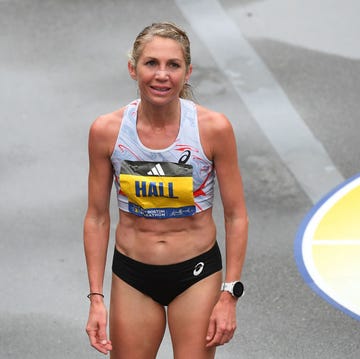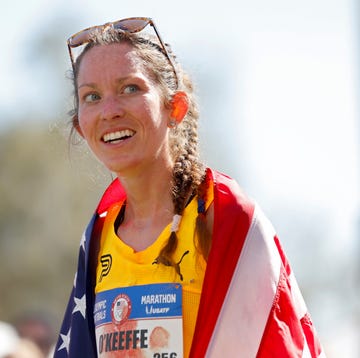When the 5,000-meter finals are run this weekend at the IAAF World Championships in Beijing, it’s likely that they’ll be won in times much slower than the medalists’ personal bests. Why is that? Why do so many championship races start slowly and finish with a big sprint? And why don’t runners who know they’ll be facing great kickers take the pace out hard from the start and dare the rest of the field to go with them?
Consider the men’s steeplechase final that was run on Monday in Beijing.
In July, Evan Jager ran the U.S. record of 8:00.45 in a fast-from-the-start race in Paris, and beat some of the Kenyans he faced at the world championships. Yet in Beijing, Jager didn’t run as aggressively as he had in Paris. In the early stages, he bided his time in the pack. He took the lead with one lap to go, but over the next 200 meters was overtaken by the four Kenyans in the race, and he finished sixth. Ezekiel Kemboi ran his last lap in 56.6 seconds, and won in 8:11.28. In Paris, Jager beat him by 19 seconds, and beat Monday’s silver medalist, Conseslus Kipruto, by nine seconds.
Shoes & Gear.
“I’ve got to figure out how to do it my way,” he said. “I don’t think I can do it their way and beat them.”
But how?
It’s much harder than it looks. History shows that, by and large, championships races are won by the fastest kickers. Just look at the women’s 1500 final on Tuesday. After a crawling early pace, gold medalist Genzebe Dibaba ran the final 800 in 1:56.9—fast enough to win most 800-meter races.
Because Dibaba is the world record holder, six seconds faster than the rest of the field, everyone waited for her to make the decisive move. The Ethiopian, of course, didn’t care much about her rivals’ tactics, such was her supremacy.
“It was my race tactic to start slowly, then cover the last two laps in 1:57,” she said. “I didn’t think about the others’ plans.”
Dibaba’s dominance is an extreme example of what’s true in many championship fields—the runners with the fastest personal bests are among the best kickers. When the race favorite holds a strong personal best, coupled with great finishing speed, the accepted wisdom is to sit in the pack, tussle for a good position, and be ready to move when things heat up in the closing laps.
“In championship races, no one really wants to be the person who leads,” says U.S. champion Nicole Tully, who will face Dibaba in the 5,000 final on Sunday. “I’ll expect it to just skip around for about six laps, and I’ll expect it to separate with about four laps to go.”
Japanese women have been an exception at recent championships. With two qualified for Sunday’s final, Tully expects one of them to take the early pace.
But the faster of them, Misaki Onishi, holds a personal best more than a minute slower than that of race favorite Dibaba. No matter how fast Onishi goes, she won’t drop the Ethiopian.
Kenya’s Viola Kibiwott admits that, with Dibaba in the field, few will be willing to push the pace and risk their medal chances. “We just plan to follow the Ethiopians,” she says. “In championships we go only for position; we don’t go for time.”
Another finalist, Australia’s Eloise Wellings, is expecting a slow pace, which she feels is due to the intimidating nature of the personal bests and finishing kicks of the Africans.
“The leader in the 5K for the first three laps almost never wins,” says Wellings. “The Africans are all kickers, and no one wants to be the one to sacrifice their race by going out front.”
Major Changes Hit Northern Arizona Elite.
On Tuesday, David Rudisha led from start to finish in the men’s 800 final. But as the world record holder, with a personal best almost two seconds faster than the other seven men in the field, it’s likely the Kenyan could have won any way he chose.
“Rudisha is an anomaly,” says Wellings. “That’s why everyone loves him, because he gets out there, has a crack and leads from the front. He’s fearless, but not everyone has that talent.”
As a result, championship races become a necessarily selfish pursuit, with everyone trying to protect their best interests.
“It’s a different kind of pressure,” says Leo Manzano, who used his trademark kick in the men’s 1500 semi-final on Friday to qualify for Sunday’s final. “It weighs a lot, so it becomes a very tactical race. It’s more mental, more of a chess game. For those without the fast finish, the only thing you can do is get in a good position and hope that it’s a faster pace.”
This year, six men have run under 3:30 in the 1500, and 14 have gone sub-3:31. But it’s been 14 years since a major championship final has been run at that pace, with world record holder Hicham El Guerrouj winning the 2001 world title in 3:30.68.
The NCAA Runner-Up Finished 2ndWith One Shoe Matthew Centrowitz, who also qualified for Sunday’s 1500 final. “El Guerrouj is the world record holder, so when you’re that much better than everyone else, it only makes sense that you push it along and don’t wait for something to happen,” he says.
“Everyone does what’s in their best interests, and there are a lot of good kickers,” says Centrowitz. “There’s no one that’s such a clear-cut favorite to go and push the pace like that.”
Another big-kicking American who will be in Sunday’s final, Robby Andrews, says the slow championship finals are a result of athletes being so evenly matched that no one wants to make the pace, even if it would usually suit him better.
“Everybody’s on the same level here, so you’re trying to make sure you’re in the right spot,” he says. “There’s a lot more to lose by going one percent too hard as opposed to being more reserved in the early laps.”
Slow races, says reigning Olympic 1500 champion Taoufik Makhloufi of Algeria, are also more likely to give the whole field a chance against the favorites.
“No one wants to give the race away by being in the front,” he says. “When the race is really slow, everyone’s level will be a lot closer, so the 3:26 guy will be a lot closer to the 3:30 guy.”
So don’t be automatically be disappointed when the remaining distance races in Beijing start at a pedestrian pace, with everyone watching and waiting for the big move. When medals are on the line, elites care about being in front only when it matters—at the finish.

Cathal Dennehy is a freelance writer based in Dublin, Ireland, who covers the sport for multiple outlets from Irish newspapers to international track websites. As an athlete, he was Irish junior cross-country champion and twice raced the European Cross Country, but since injury forced his retirement his best athletic feat has been the Irish beer mile record. He’s happiest when he’s running or writing stories about world-class athletes.













